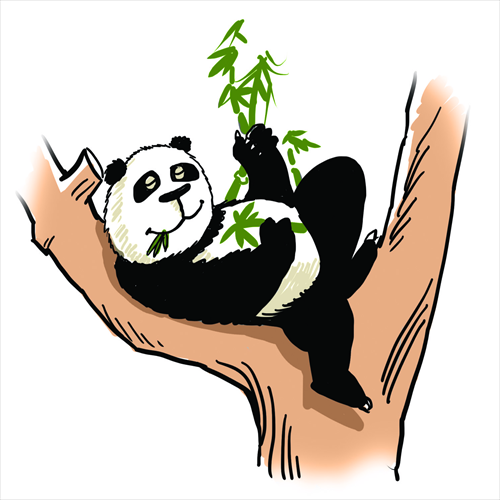Why won't China follow Russia's path?

Illustration: Liu Rui/GT
During his recent visit to Berlin, Chinese President Xi Jinping received a special gift from German Chancellor Angela Merkel, the first precise map of China made by esteemed French cartographer Jean-Baptiste Bourguignon d'Anville (1697-1782) in 1735.
That year was the height of the Qing Dynasty (1644-1911), when the Emperor Qianlong ascended to the throne. The map includes the Island of Sakhalin to the northeast, Taiwan to the southeast, Ili River to the west, Lake Baikal to the north and Hainan to the south.
Russia's annexation of Crimea has given rise to Merkel's concern about the possible consequences of China's rejuvenation.
She conveyed complicated information by presenting an antique map depicting the ancient China with all the inseparable parts of the country in ancient times.
We all understand the sensitivity of Europeans toward boundary-related issues. Border changes have always been a worry in Europe, posing a lethal threat to its peace and stability and dragging regional stakeholders into frequent battles.
In such circumstances, making it clear that China is no way Russia has become an urgent task of our public diplomacy in Europe. China does not have to pick a side in the Ukraine crisis. But we should take such comparisons seriously.
In a keynote speech at the College of Europe in Bruges, Belgium, Xi said, "For any country in the world, the past always holds the key to the present and the present is always rooted in the past. Only when we know where a country has come from, could we possibly understand why the country is what it is today, and only then could we realize in which direction it is heading."
The culture shaped during the development of the two nations distinguishes China from Russia.
Russia began in the medieval state of Kievan Rus and then expanded from Europe to Asia to Siberia in the Far East, making it the largest country stretching across Eurasia in the world.
In contrast, the vast grassland to the north, tributary states to the south, boundless sea to the east and the cloud-kissing Himalayas to the west have endowed China with a mentality of being a "Middle Kingdom."
Therefore, it is temporal logic, not spacial, that has been dominating China's culture. The nation values the natural appeal of its own culture, rather than geographical expansion. These determine historically that China will not follow Russia.
From the perspective of the status quo, China and Russia are different in dependence on the rest of the world.
As the second largest economy in the world and a major participant in, beneficiary and builder of the globalization, China relies on the two engines of export and investment to beef up economic growth.
China's external dependence prompts it to cooperate with other nations in a peaceful way.
This is fundamentally different from Russia, which mainly relies on energy and arms exports. With less economic reliance on the rest of the world, Russia can offend the West which in turn has to resort to Russia's energy and diplomatic clout.
Furthermore, China and Russia have different expectations for the future.
Though Russians are also yearning for bright prospects, Chinese are more optimistic about their future according to various opinion polls.
And affected by the mentality of changing oneself and influencing the world, the Chinese people firmly believe that the Chinese dream is consistent with the dream of other peoples. The Chinese will not ruin the country's opportunities for strategic development.
China has signed border agreements with almost all 14 countries it shares a land border with, the exceptions being India and Bhutan.
M. Taylor Fravel, an expert on Chinese strategy at the Massachusetts Institute of Technology, has pointed out that China, which embraces political compromise instead of using force, tends to solve border disputes through negotiations.
Generally speaking, China does not need to emulate Russia.
The Chinese people have learned from their experience in the modern times that peace, development, cooperation and win-win progress are the most significant values in getting along with the rest of the world.
The author is director of the Institute of International Affairs and professor with the School of International Studies, Renmin University of China. opinion@globaltimes.com.cn